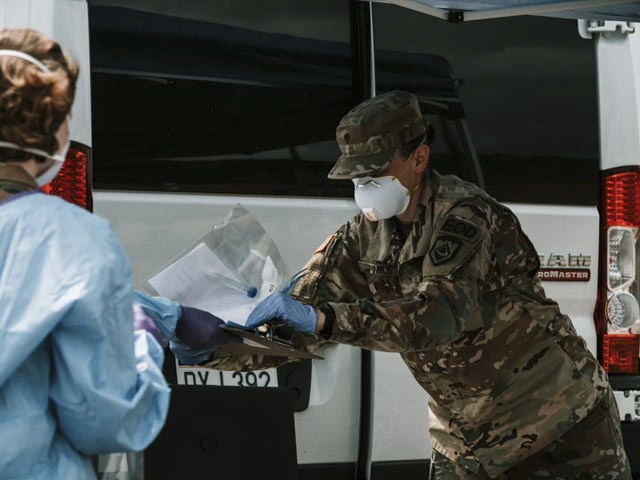 A West Virginia Army National Guard Soldiers assists with COVID-19 testing preparation June 1, 202, at the Mountaineer ChalleNGe Academy at Camp Dawson in Kingwood, W.Va. The Mountaineer ChalleNGe Academy was closed in March to in person classes due to the COVID-19 pandemic but WVNG and MCA staff developed plans to ensure cadets were afforded the opportunity to test and graduate. (U.S. Army National Guard photo by Sgt. Davis Roher)
A West Virginia Army National Guard Soldiers assists with COVID-19 testing preparation June 1, 202, at the Mountaineer ChalleNGe Academy at Camp Dawson in Kingwood, W.Va. The Mountaineer ChalleNGe Academy was closed in March to in person classes due to the COVID-19 pandemic but WVNG and MCA staff developed plans to ensure cadets were afforded the opportunity to test and graduate. (U.S. Army National Guard photo by Sgt. Davis Roher)
KINGWOOD, W.Va. – As the COVID-19 pandemic continues to maintain its grip on the United States, the Mountaineer ChalleNGe Academy (MCA) has developed innovative ways to ensure at-risk youth can continue the course and, for some, earn their high school diploma.
West Virginia was one of the last states in the nation to announce its first case of COVID-19. As cases were reported and schools were shut down across the state, it was evident that the MCA would need to send its cohort of cadets home to finish their education.
On March 21, Maj. Gen. James Hoyer, the adjutant general of the West Virginia National Guard (WVNG), made the difficult decision to shutter the academy until it was safe to bring students back.
Traditionally, cadets go through a five-month residential phase at Camp Dawson. With the pandemic altering educational paths throughout the nation, it was imperative that a plan was in place to ensure their education could continue without interruption, said Dianna Trickett, program director for the MCA.
“Immediately, we started online education curriculum through various platforms and also created a private Facebook group where cadets could connect and share information with one another and their parents or guardians,” she said.
ChalleNGe Academy teachers held education sessions three times a day during the week. Also, each cadet was assigned an MCA staff member who made daily contact to assess any needs – whether that be educational, physical or emotional.
Upon their departure from Camp Dawson, each cadet was given options. They could continue with online education and return in June to complete testing for the program, discontinue the online education and return to MCA in a future class, or discontinue online education and remove themselves from the program. Of the 157 cadets who started the program in January, 108 chose to remain in the program and continue with testing, 41 chose to return in a future class and eight left.
“We have all but a few cadets who have chosen to continue on in the program,” Hoyer noted. “I think it’s a great testament to our staff and faculty. It is exceptionally important that we continue to support these young folks, as they have put in so much work during this unprecedented time to complete the ChalleNGe Academy and earn their diploma. I couldn’t be more proud of these young men and women.”
This week, the WVNG has been working with MCA staff and cadets to ensure they are prepared to take their end-of-course exam in a safe manner consistent with Centers for Disease Control and Prevention (CDC) guidelines. COVID-19 testing is ongoing for the 100 cadets who met all the requirements to be eligible to return for their final test.
“I didn’t want to go home because I was so used to the routine [at MCA],” said Analisa Wood, a cadet from Dunbar who aspires to join the Marine Corps. “I was excited to be able to return, take my test and have the chance to earn my diploma. I have had so many opportunities [at MCA] that I wouldn’t have gotten if I would have stayed in a regular high school, and I’m thankful for that.”
All staff and cadre who are assisting in the exam were tested beginning May 29, using the WVNG’s mobile testing lab that can deliver results in 15 minutes. The mobile testing unit went to designated locations across the state where cadets were tested. Once cleared with a negative result, they will be transported to Camp Dawson.
Beginning in October, the MCA is expanding into its second location in Montgomery, where an additional 200 cadets can attend a National Guard Youth ChalleNGe Program. Currently, MCA North graduates approximately 300 cadets each year, with around 85% earning their high school diploma through the program.
MCA helps to redirect the lives of teens who have fallen behind in the traditional education system. With graduates from all 55 counties, MCA offers a safe, structured training environment for volunteer youth who strive to improve their lives.
Since its inception in 1993, the MCA has graduated 4,663 cadets from the program, with 1,704 earning their high school diploma through the West Virginia Department of Education Options Pathway Program.
Distributed by permission of DOD


